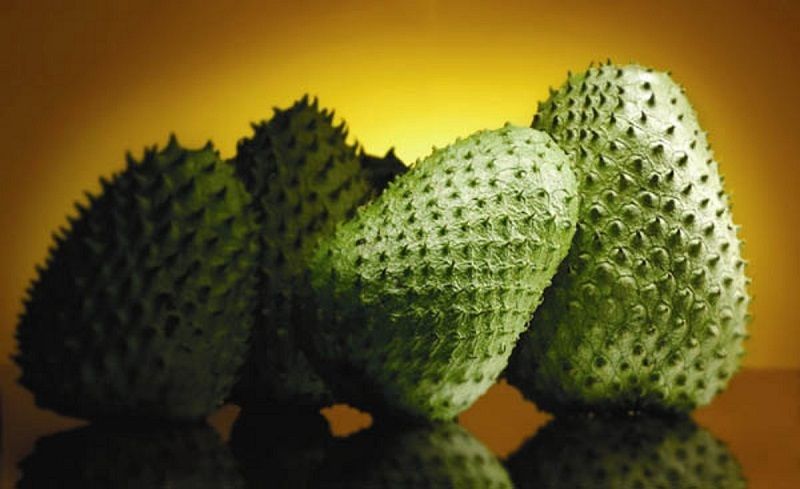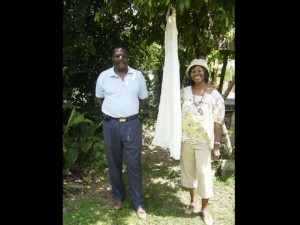Soursop Alternative Cancer Treatment: Your Complete Guide

From deep within the Amazon Rainforest, researchers have discovered that extracts from the Graviola tree kill cancer cells 10,000 times more effectively than chemotherapy.
The spikey-fruit, known as Soursop, is produced by the Graviola tree – a flowering, evergreen also known as Annona muricata. It has a wide array of potent anticancerous agents, called Acetogenins, which have been shown to destroy many varieties of cancer. In traditional medicine it has been widely used for the treatment of cancer and tumors.
In Spanish, the Soursop fruit has been named Guanabana. Although the graviola tree is native to Central and South American countries, primarily Colombia, Brazil, Peru, Ecuador, Venezuela, and Puerto Rico, it can also be found in some parts of Africa and Asian countries.
The large Soursop fruit has a white inner pulp with a texture similar to that of a banana. It tastes sweet, with a flavor that some describe as a combination of strawberry and pineapple, with a hint of sour citrus.
TABLE OF CONTENTS
8 Medical Studies on Soursop vs Cancer
- Published in the Journal of Natural Products in 1996, a study found that a seed-extract from the graviola fruit was “selectively cytotoxic to colon adenocarcinoma cells (HT-29) in which it was 10,000 times the potency of adriamycin.”
- A study conducted in 2014 examined an extract of the graviola tree leaves, called ethyl acetate, and its effects on lung cancer cells (A549). The results showed that the ethyl acetate extract “inhibited the proliferation of A549 cells, leading to cell cycle arrest and programmed cell death.”
- Three new anti-carcinogenic compounds isolated from powdered graviola fruit have been discovered in this 2014 study. The compounds are called Muricins J, Muricins K, and Muricins L, and all three “demonstrated an antiproliferative [effect] against human prostate cancer PC-3 cells.”
- Researchers from India conducted a study in 2013, to text the effects of Graviola leaf extract against human cervical cancer cell line called HeLa. What they found was “HeLa cells treated with 75 μg of a crude leaf extract of A. muricata showing 80% of cell inhibition.”
- An aqueous leaf extract of A muricata was put to the test against prostate cancer cells in 2014. This study is unique because it tests both cultured cancer cells in vitro, as well as cancerous prostate glands in rats, or in vivo. The best results were obtained after 48 hours, and “annona muricata has antiproliferative effects on BPH-1 cells and reduces prostate size, possibly through apoptosis,” the researchers concluded.
- A 2012 study evaluated the therapeutic potential of a Graviola tree extract against pancreatic tumors, a type of tumor very resistant to chemotherapy. Graviola extract induced pancreatic cancer cell death “by inhibiting cellular metabolism”. In other words, the extract squeezed the life out of the cancer cells by not allowing them to produce energy. Their results indicated “promising characteristics of the natural product against this lethal disease.”
- Breast cancer is the most common cancer among Canadian women, and so millions of women could benefit from a therapy which, unlike chemotherapy, actually works more than 3% of the time. In the current study, the Graviola fruit extract induced cancer cell death in human breast cancer cells, and inhibited tumor growth by 32%!
- The purpose of this study was to investigate the anticancer properties of Annona muricata leaf extract on human colon cancer cells. The cytotoxic effects of the leaf extract from the Graviola tree were “significant”, and induced apoptosis, or cell death in human colon cancer cells.
Yvonne Kirlew Cures Her Cancer with Soursop

Ray and Yvonne Kirlew, standing underneath a graviola tree.
After being diagnosed with lymphatic cancer in 2002, Yvonne Kirlew of Discovery Bay, St. Ann underwent agonizing chemotherapy treatments, which both her and her husband Ray felt only made her worse. She even began planning her own funeral, she was so convinced of her pending demise.
Determined to keep his wife alive, Ray nursed her back to health. Miraculously, she survived. Then, between December 2008 and March 2009, her cancer returned.
Just as the doctors once again recommended chemotherapy treatment for her, her husband Ray got an email from a friend that talked about the cancer curative properties of the Graviola tree. Fascinated with his new discovery, Ray went ahead and brewed together the leaves and bark of the soursop tree for his wife to drink to kill her cancer cells.
After one month of treatment using the graviola leaf-bark brew, Yvonne’s health improved enormously. Doctors tested her in 2009 to determine when she would need Chemotherapy, and found something that surprised them. The movement of her cancer cells had stopped, and after a series of other tests a few months later, Yvonne was completely cancer free.
Conclusion
If you’re aware of the study that showed cancer patients who receive chemotherapy die sooner than those who receive no treatment at all, then the graviola tree and its extracts present a safe, and effective alternative treatment for you to explore. It is my hope that this article empowers you to make an informed decision as to whether or not you would accept damaging mainstream treatments or use safe and effective natural medicines.
